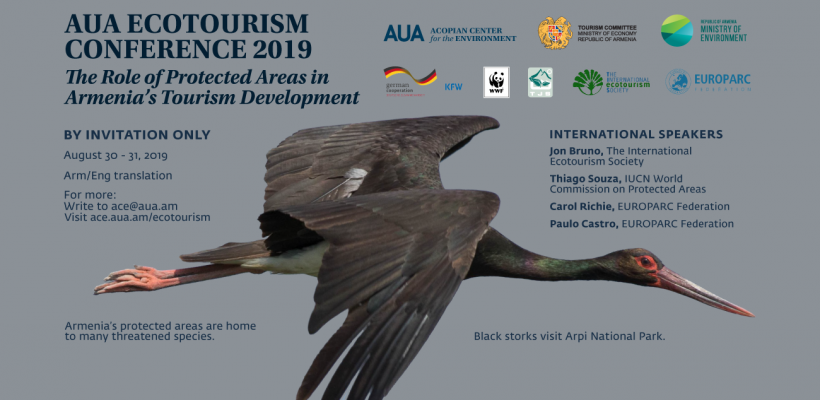
The Fourth AUA Ecotourism Conference Turns Over a New Leaf
3 min readYEREVAN, Armenia – The Acopian Center for the Environment of the American University of Armenia (AUA) is organizing its fourth annual AUA Ecotourism Conference on August 30 – 31.
This year, the organizing partners of the Conference are the Tourism Committee of the Ministry of Economy of the Republic of Armenia (RA), RA Ministry of Environment, WWF Armenia, KfW – German state-owned development bank, the International Ecotourism Society, and EUROPARC Federation.
The Conference will focus on the role of protected areas in tourism development, particularly on ways to ensure protecting the environment and enabling nearby communities to benefit from growth in tourism. This focused policy discussion is a departure from previous years.
“We are in the process of developing Armenia’s tourism strategy and our protected areas are national jewels that should be an integral part of this strategy. The main challenge is to ensure that tourism in protected areas is sustainable economically, socially and environmentally,” says Susanna Safaryan, head of Armenia’s Tourism Committee at the Ministry of Economy.
Deputy Minister of Environment Vardan Melikyan adds, “While developing ecotourism, we should prioritize the conservation of our natural landscapes and biodiversity, especially in places like Khosrov Forest, which is one of the oldest, if not the oldest, protected areas in the world. Such biodiversity hotspots have to be used for scientific purposes, while tourism must be limited both spatially and in terms of the number of visitors. Another important aspect is making sure ecotourism development benefits the communities surrounding protected areas.”
The Conference will also discuss the possibilities of implementing the European Charter for Sustainable Tourism in Protected Areas (EUROPARC Charter) in Armenia. “The EUROPARC Charter is a practical management tool that enables protected areas to advance sustainable tourism,” says Karen Manvelyan, director of WWF Armenia. “Within one of our projects “Transboundary Joint Secretariat (TJS)” we have studied the possibilities of implementing the EUROPARC Charter in three protected areas of Armenia: Khosrov Forest State Reserve, Dilijan National Park, and Lake Arpi National Park. At the Conference, we will review the work done to date and explore ways in which it can be accelerated,” he adds.
Litta Petrosyan, AUA Acopian Center’s Environmental Education and Community Outreach Manager, emphasizes that the Center “has talked to key stakeholders to develop this year’s agenda. The Conference comes at a critical juncture to propel policy discussions on the role of nature and nature protection in the development of Armenia’s growing tourism industry.” She adds that unlike previous years, “We are inviting international experts who will help us put our work in the global context.”
The following speakers from key international organizations will deliver presentations and share their expertise:
- Jon Bruno, Executive Director of The International Ecotourism Society, “The Global Ecotourism Market: The Trends and How Armenia Can Tap into Opportunities.”
- Thiago Souza, IUCN World Commission on Protected Areas, Tourism Specialists Group, “Economic Impact of Sustainable Tourism in Protected Areas: Global Evidence.”
- Carol Richie, Executive Director of the EUROPARC Federation, “Environmental and Social Sustainability of Tourism in Protected Areas.”
- Paulo Castro, Council Member, EUROPARC Federation, “Success Factors for Adopting and Implementing EUROPARC Charter.”
This year, the AUA Ecotourism Conference 2019 is by invitation only. Those interested should write to [email protected]. More information on the speakers, panel discussions, and Conference agenda is available at https://ace.aua.am/ecotourism.
The AUA Acopian Center for the Environment, a research center of the American University of Armenia, promotes the protection and restoration of the natural environment through research, education, and community outreach. The AUA Acopian Center’s focus areas include sustainable natural resource management, biodiversity and conservation, greening the built environment, clean energy, and energy efficiency, as well as information technology and the environment.
